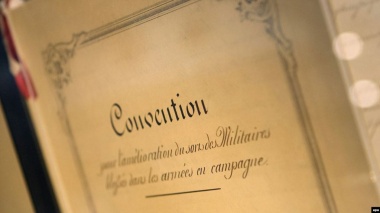CPI “Ideas for Change” supports Euromaidan SOS Appeal on “Denazification Courses” as a War Crime against Civilians in territories temporarily occupied by Russia, dated June 4, 2022.
Volodymyr Romanov, a resident of Sevastopol, has been running “The Denazification” column on his telegram channel since May 18, 2022. He publishes videos in which citizens of Ukraine, residents of Kherson, Zaporizhia regions and the Autonomous Republic of Crimea apologize for disloyal statements about the russian army and russian servicemen on social networks. In these videos, victims recite pre-prepared text, sometimes simply reading it from paper. At the end of the speeches, these people say the words: “I have completed a full course of denazification.” The so-called “denazification” was declared by the russian regime as a justification for russia’s military aggression against Ukraine.
Videos of victims of “denazification” are freely available, they have become the subject of a journalistic investigation by “Novaya Gazeta”.
People in the videos do not apologize voluntarily. This is evidenced by the following facts:
1. Apologies videos are not posted on the pages of people who appear on the video. These recordings are posted on Vladimir Romanov’s telegram channel.
2. Some people are removed from circumstances that degrade them. Roman Safarov, for example, in a video from May 19, 2022, is stripped to the waist.
3. Some people show signs of violence in the video. Traces of blood can be seen in the corner of Viktor Kvitka’s mouth in a video from May 20, 2022.
The degrading treatment of civilians in the occupied territories is a gross violation by the Russian Federation of the Convention (IV) for the Protection of Civilian Persons in Time of War of 12 August 1949.

Article 3, paragraph 1, subparagraph (z), prohibits the encroachment on human dignity, in particular, abusive degrading treatment. Article 27 of the Convention states: “Protected persons have the right in all circumstances to respect for their identity, honor, family rights, religious beliefs and rites, habits and customs. They will always be treated humanely, and in particular they will be protected from any acts of violence or intimidation, from the insults and curiosity of the crowd.”
Article 75 (2), subparagraph (e), of Additional Protocol 1 to the Geneva Conventions of 12 August 1949, concerning the Protection of Victims of International Armed Conflicts, prohibits the threat of degrading or abusive treatment.
The Convention for the Protection of Civilian Persons in Time of War establishes obligations for the Russian Federation. This Convention applies even if one of the parties does not recognize the state of war, as well as in all cases of occupation. Additional Protocol I provides for different options for responding to violations, such as the work of the International Fact-Finding Commission. In 2019, the Russian Federation left the competence of the International Fact-Finding Commission. At present, the International Commission cannot independently initiate an investigation into russia’s violations of international humanitarian law. Nevertheless, russia must comply with the requirements of the Convention for the Protection of Civilian Persons in Time of War in the Occupied Territories.
The acts against the citizens of Ukraine referred to in this statement, namely the encroachment on human dignity, in particular insulting and degrading treatment, are war crimes under Article 8, paragraph 2, of the Rome Statute of the International Criminal Court.
We declare the inadmissibility of humiliation and abuse of Ukrainian citizens in the russian-occupied territories and call for an end to this inhumane practice.
We ask the law enforcement agencies of Ukraine to verify the stated facts and initiate criminal proceedings against those guilty of violating the rights of Ukrainian citizens.
We pay attention to this war crime of the International Criminal Court and the International Commission of Inquiry established by the UN Human Rights Council.
We reiterate our call on international organizations to ensure an international presence in the russian-occupied territories, where people are left alone with the occupier.